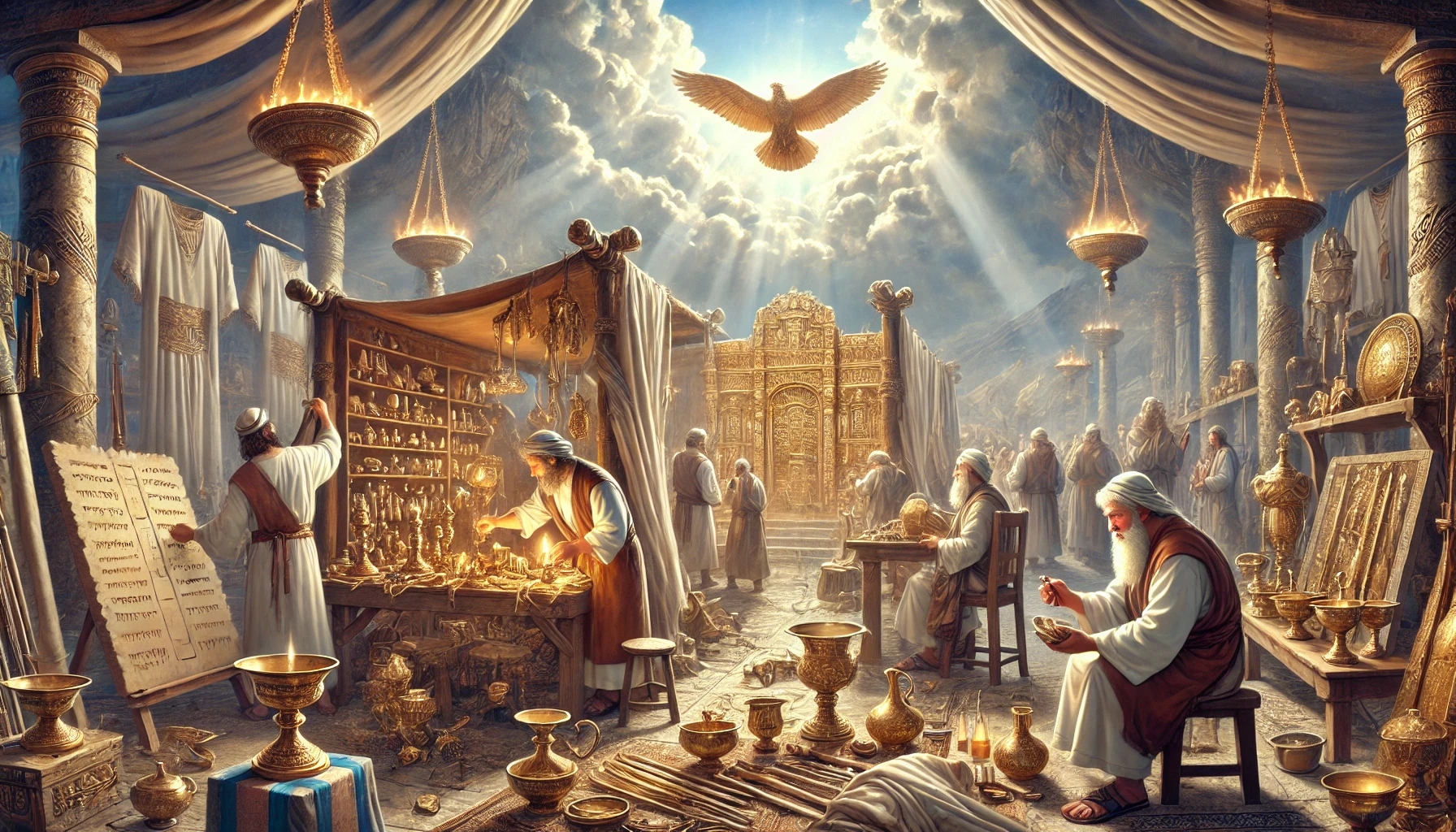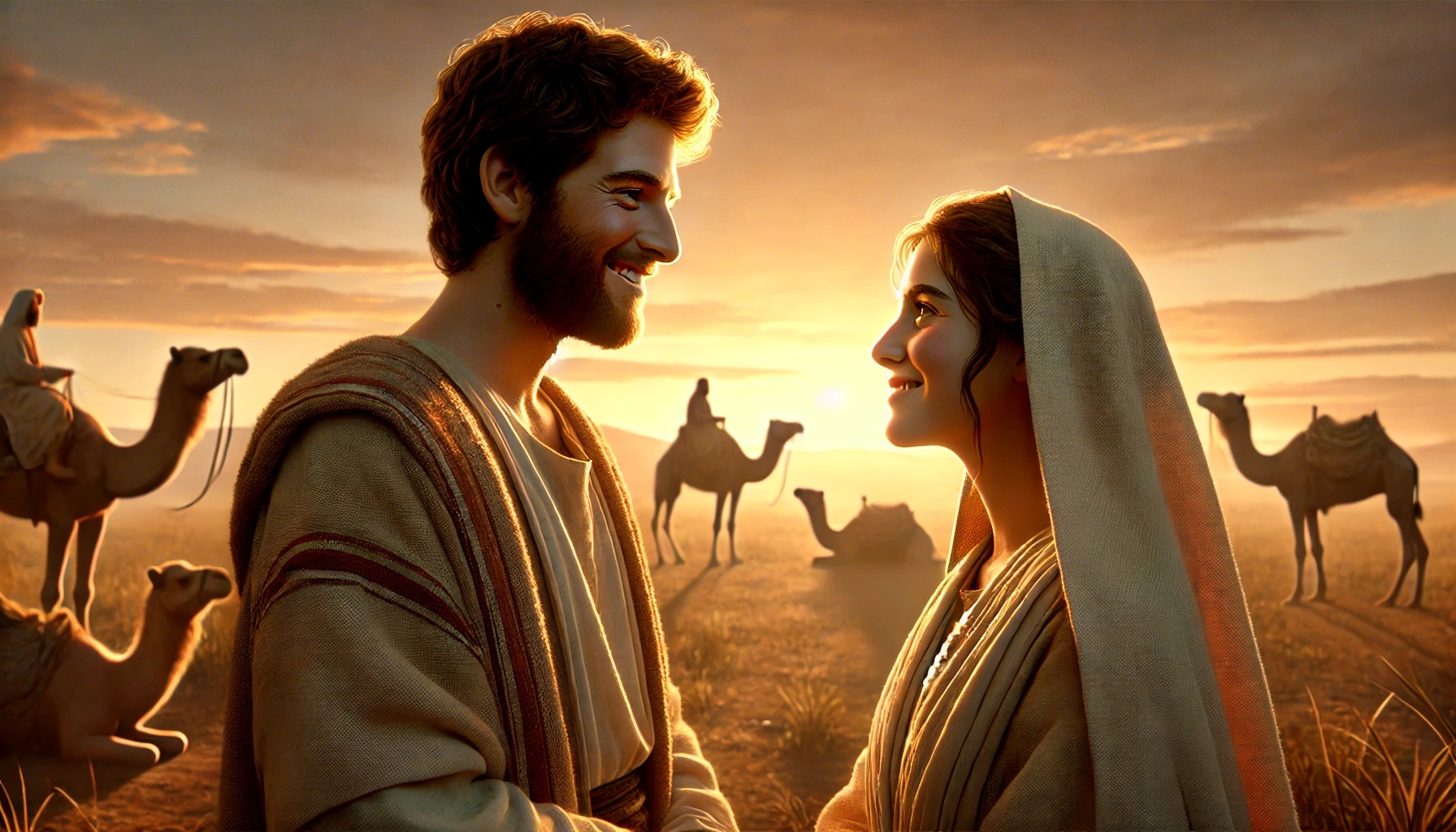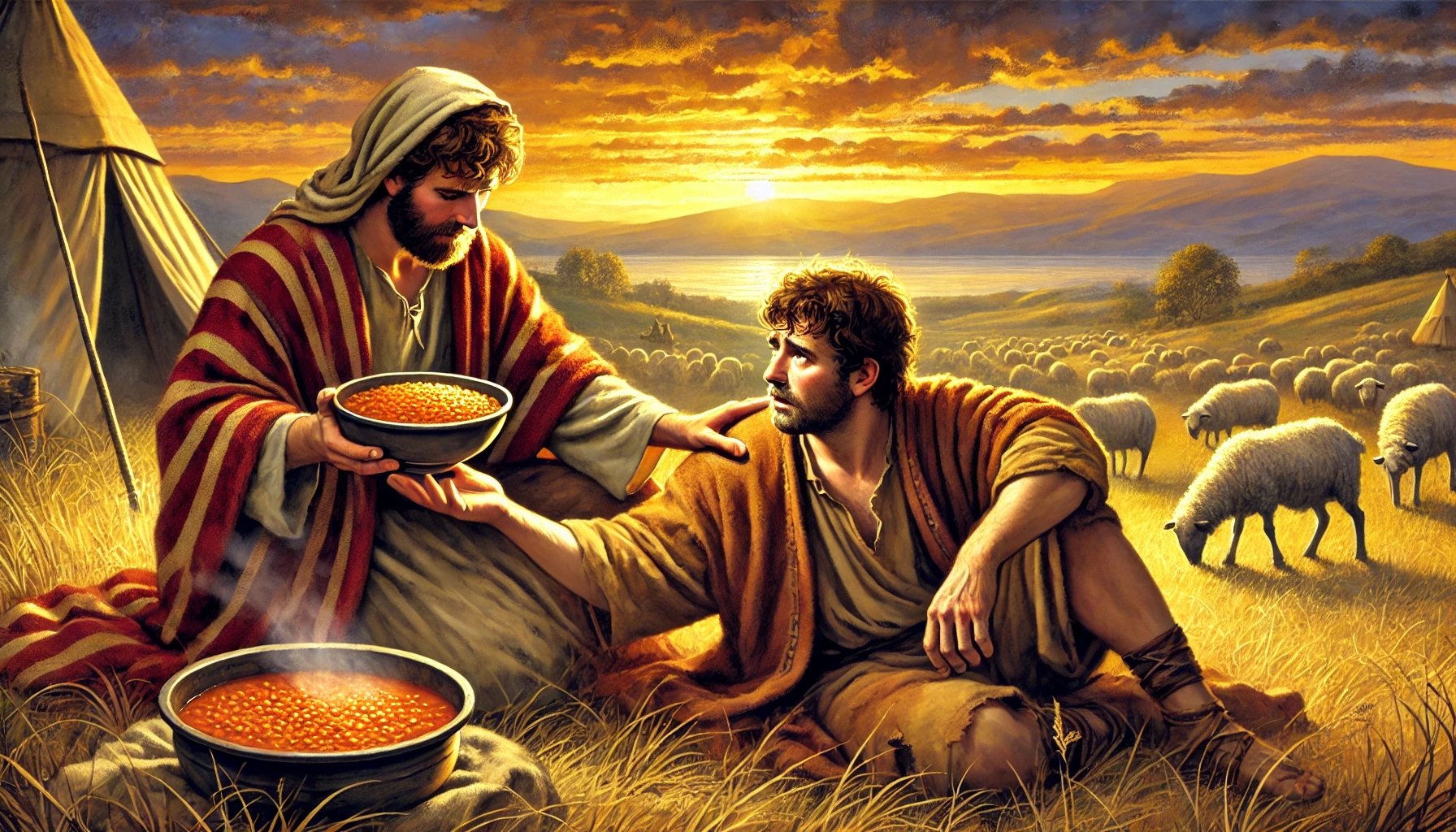
📅 July 6, 2025
📖 DAILY BIBLE READING
✨ Exodus 31 – Called, Gifted, Blessed – and Called to Obedience
⛺ God’s Spirit empowers for service – the Sabbath as a sign of sanctification
══════════════════════════════════════════════
📜 Bible Text – Exodus 31 (KJV)
1 And the Lord spake unto Moses, saying,
2 See, I have called by name Bezaleel the son of Uri, the son of Hur, of the tribe of Judah:
3 And I have filled him with the spirit of God, in wisdom, and in understanding, and in knowledge, and in all manner of workmanship,
4 To devise cunning works, to work in gold, and in silver, and in brass,
5 And in cutting of stones, to set them, and in carving of timber, to work in all manner of workmanship.
6 And I, behold, I have given with him Aholiab, the son of Ahisamach, of the tribe of Dan: and in the hearts of all that are wise hearted I have put wisdom, that they may make all that I have commanded thee;
7 The tabernacle of the congregation, and the ark of the testimony, and the mercy seat that is thereupon, and all the furniture of the tabernacle,
8 And the table and his furniture, and the pure candlestick with all his furniture, and the altar of incense,
9 And the altar of burnt offering with all his furniture, and the laver and his foot,
10 And the cloths of service, and the holy garments for Aaron the priest, and the garments of his sons, to minister in the priest’s office,
11 And the anointing oil, and sweet incense for the holy place: according to all that I have commanded thee shall they do.
12 And the Lord spake unto Moses, saying,
13 Speak thou also unto the children of Israel, saying, Verily my sabbaths ye shall keep: for it is a sign between me and you throughout your generations; that ye may know that I am the Lord that doth sanctify you.
14 Ye shall keep the sabbath therefore; for it is holy unto you: every one that defileth it shall surely be put to death: for whosoever doeth any work therein, that soul shall be cut off from among his people.
15 Six days may work be done; but in the seventh is the sabbath of rest, holy to the Lord: whosoever doeth any work in the sabbath day, he shall surely be put to death.
16 Wherefore the children of Israel shall keep the sabbath, to observe the sabbath throughout their generations, for a perpetual covenant.
17 It is a sign between me and the children of Israel for ever: for in six days the Lord made heaven and earth, and on the seventh day he rested, and was refreshed.
18 And he gave unto Moses, when he had made an end of communing with him upon mount Sinai, two tables of testimony, tables of stone, written with the finger of God.
══════════════════════════════════════════════
🔵 Introduction
In Exodus 31 we witness something special: God Himself appoints men, fills them with His Spirit, and commissions them to build the sanctuary. At the same time, He gives a strong reminder to the people about keeping the Sabbath – as an eternal sign of the covenant between Him and Israel. These two calls – to work and to rest – do not contradict but rather wonderfully complement each other.
══════════════════════════════════════════════
🟡 Commentary
🛠️ 1. Called to Holy Work (Verses 1–11)
God names Bezalel specifically – this shows a personal calling.
He fills him with the Spirit of God, giving:
-
Wisdom
-
Understanding
-
Knowledge
-
Skill in craftsmanship
👉 This reveals that God’s Spirit is not only active in preaching and prayer, but also in practical work – when it is done for the Lord. Artistry in wood, metal, and fabric is just as spiritually significant as words at the altar.
God also appoints Oholiab – and all the wise-hearted craftsmen to whom He has given wisdom.
This highlights that gifting comes from God, but service happens in community.
▶️ Their main task: to build the sanctuary, as God had described in detail (vv. 7–11).
This work was holy because it served God’s presence and worship.
🕊️ 2. The Sabbath as a Sign of the Covenant (Verses 12–17)
After the calling to work, comes a solemn call to rest:
“Keep my Sabbaths, for this is a sign between me and you…” (v. 13)
The Sabbath is:
-
A sign of sanctification (v. 13)
-
Holy to the people (v. 14)
-
An everlasting covenant (v. 16)
-
A perpetual sign between God and Israel (v. 17)
Why the emphasis?
Because in the midst of work, success, and activity, we are in danger of forgetting God.
The Sabbath calls us back to our identity – as the sanctified, not the stressed.
Its seriousness is underlined:
Whoever profanes the Sabbath or works on it must die (vv. 14–15).
This shows the depth of the covenant.
▶️ The Sabbath is not a burden, but a sign of grace:
A weekly reminder of the Creator, rest, and sanctification.
📜 3. The Stone Tablets (Verse 18)
God gives Moses two stone tablets, written with the finger of God.
➡️ They represent the unchanging authority of God’s law.
➡️ They connect the spiritual command (Sabbath) with practical implementation (commandments, order, holiness).
══════════════════════════════════════════════
🟢 Summary
Exodus 31 presents two core aspects of our relationship with God:
-
The active calling to service – empowered and equipped by the Holy Spirit
-
The holy calling to rest – expressed in the Sabbath as a covenant sign
Both belong together: obedient work + trusting rest
══════════════════════════════════════════════
📢 Message for Us Today
In a world that idolizes performance and eliminates rest days, God still calls:
-
Be ready to use your gifts for God’s kingdom. Whether in music, tech, craftsmanship, leadership, or teaching – the Holy Spirit empowers you.
-
But don’t lose touch with God: the Sabbath is not outdated, but timelessly meaningful.
It calls us weekly to spiritual renewal, to remember who we are in Christ – sanctified, loved, and called.
══════════════════════════════════════════════
💡 Reflection Questions
What if you used your gifts not for yourself, but intentionally in service to God?
When was the last time you truly kept the Sabbath holy – in heart and lifestyle?
Are you living by your own strength – or by the Spirit of God, who fills you with wisdom, understanding, and skill?
~~~~~⛺~~~~~
📆 July 06 – 12, 2025
📆 WEEKLY SPIRIT OF PROPHECY READING
📖 Ellen G. White │ Patriarchs and Prophets – Chapter 15
✨ The Marriage of Isaac
📖 Read online here
══════════════════════════════════════════════
🔵 Introduction
In a world where personal freedom is often placed above wisdom and obedience, the story of Isaac’s marriage stands out as a radiant counterexample. It shows how God Himself takes the lead in one of life’s most important decisions: the choice of a spouse. Abraham, the father of faith, does not leave this matter to chance or mere emotion but trusts in divine guidance — and Isaac trusts him.
This event is not just a family story, but a powerful lesson about obedience, character formation, true love, and God’s blessing.
══════════════════════════════════════════════
🟡 Commentary
📌 1. The Spiritual Significance of Marriage
Isaac’s marriage was not just a personal matter — it had implications for God’s plan for humanity. Isaac was the bearer of the promise; from his line would come the chosen people and, ultimately, the Messiah. A marriage with a Canaanite woman would have endangered that spiritual mission, as these peoples were deeply immersed in idolatry.
➡️ Key thought: Marriage is a spiritual covenant — it shapes generations.
📌 2. Abraham’s Responsibility as a Father
Although old, Abraham takes full responsibility for Isaac’s marriage with great foresight. He sends Eliezer, his faithful servant, with a clear mission: the wife must come from their believing relatives — and Isaac must not travel to Mesopotamia.
Abraham’s trust in God’s guidance runs deep. He says with conviction:
“The Lord will send His angel before you.” (Genesis 24:7)
➡️ Key thought: Parental care and spiritual guidance are irreplaceable — especially in matters of the heart.
📌 3. Eliezer’s Spiritual Attitude
Eliezer does more than just set out — he prays. At the well, he asks God for a sign of kindness and helpfulness — traits fitting for a God-fearing life. Rebekah’s response to his simple request becomes the answer to his prayer.
➡️ Key thought: Those who pray sincerely can recognize God’s guidance — even in everyday encounters.
📌 4. Rebekah’s Decision – Free and Faithful Consent
Despite all the preparation, Rebekah’s own will is respected. When asked if she is willing to leave her homeland, she responds freely and confidently:
“Yes, I will go.” (Genesis 24:58)
➡️ Key thought: God leads — but He never forces. Obedience is always voluntary.
📌 5. The Beginning of a Blessed Marriage
Isaac’s gentle character and upbringing in the fear of God prepare him for a blessed marriage. Rebekah becomes his wife, and the Bible says:
“He loved her… and was comforted after his mother’s death.” (Genesis 24:67)
➡️ Key thought: True love grows in the soil of faith, loyalty, and mutual dedication to God.
══════════════════════════════════════════════
🟢 Summary
Isaac’s marriage was the result of divine guidance, wise care, and voluntary consent.
Abraham, Eliezer, Rebekah, and Isaac all acted in faith, in prayer, and in obedience.
This marriage became a symbol of domestic happiness and a life under God’s blessing.
══════════════════════════════════════════════
📢 Message for Us Today
Today, the choice of a life partner is often made emotionally and independently of God’s standards. The story of Isaac and Rebekah offers a different path:
Marriage is not a private adventure, but a sacred covenant in God’s presence.
Parents and spiritual mentors have an important role — their counsel is not a burden, but a protection.
Prayer and spiritual maturity matter more than appearances or fleeting emotions.
Those who seek God’s guidance will discover that He has prepared what the heart longs for.
══════════════════════════════════════════════
💬 Reflection Question
Are you willing to let God lead in your most important life decisions — even in love?
Do you see marriage as a spiritual calling or just a romantic ideal?
Parents: Are you shaping your children’s character with love and example — or just letting them drift?
Young people: Do you see your parents as spiritual guides — or just critics?
~~~~~⛺~~~~~
📆 July 06 – 12, 2025
📆 WEEKLY SPIRIT OF PROPHECY READING
📖 Ellen G. White │ Patriarchs and Prophets – Chapter 16
✨ Jacob and Esau
📖 Read online here
══════════════════════════════════════════════
🔵 Introduction
In Chapter 16 of Patriarchs and Prophets, we meet the twins Jacob and Esau — two brothers whose character and way of life could hardly be more different. Their rivalry is not centered on worldly ambition but on one of the most essential questions of the life of faith: How much does the spiritual mean to us — how valuable is God’s promise? It is a story about priorities, decisions, and their lifelong consequences.
══════════════════════════════════════════════
🟡 Commentary
1. Two Brothers – Two Life Attitudes
Jacob is reflective, future-oriented, spiritually inclined. Esau is impulsive, adventurous, focused on the here and now. Even in the womb, God announces that the older will serve the younger. While Jacob values the birthright as a spiritual inheritance, Esau nearly mocks it and carelessly sells it for a meal.
2. The Birthright: Responsibility and Blessing
It involved more than material possessions — it meant spiritual leadership, priestly responsibility, and the privilege of being in the line through which the Redeemer would come. This right carried great spiritual dignity — but also responsibility. Esau was indifferent to this. Jacob, by contrast, deeply desired it — but unfortunately tried to obtain it by deceit.
3. Rebekah’s Influence – Faith or Manipulation?
Knowing God’s promise, Rebekah does not wait on His timing but uses human scheming. Jacob obeys, but with a troubled conscience. The deception achieves the desired blessing — but at a high cost: family division, flight, decades of separation.
4. Isaac’s Turning Point – Human Will vs. Divine Plan
Although Isaac favored Esau, he recognized after the deception that God’s will had prevailed — and he affirmed the blessing upon Jacob. Human weakness is overridden by divine providence.
5. Esau – A Moment’s Decision
The tragic moment: Esau, who had long despised the spiritual blessing, now seeks it back with tears — too late. What moves him is not true repentance, but personal loss. His story becomes a warning to all who trade the eternal for the temporary.
══════════════════════════════════════════════
🟢 Summary
Jacob and Esau represent two attitudes toward God: spiritual striving versus carnal desire. While Jacob sought the right thing the wrong way, Esau rejected the right thing altogether. God’s plan is fulfilled despite human failure — but not without painful consequences.
══════════════════════════════════════════════
📢 Message for Us Today
How much do we value God’s promises?
In a world full of distractions, offers, and instant gratification, it is easy to be like Esau — to trade the eternal for the immediate — whether through compromise in our faith or giving up spiritual principles for social or personal “peace.”
This story warns us: spiritual blessings are no game. God’s gifts are holy. When we understand their value, we will neither treat them carelessly nor try to obtain them through improper means. God fulfills His promises — but in His way, in His time, through those who trust Him.
══════════════════════════════════════════════
💬 Reflection Thought
What decision I make today could impact my eternity?
Am I — like Esau — possibly trading the eternal for the immediate?
Do I trust God to uphold His promise without my interference — or, like Rebekah, am I tempted to “help Him out”?
Lord, teach me not to misuse Your gifts — and help me to value spiritual things above temporary gain.






















